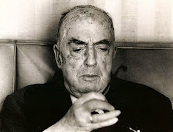Josep Carner facts for kids
Quick facts for kids
Josep Carner
|
|
|---|---|

Josep Carner el 1970
|
|
| Josep Carner i Puig-Oriol |
|
| Born | 9 February 1884 |
| Died | 4 June 1970 |
| Resting place | Montjuïc Cemetery |
Josep Carner i Puigoriol (born in Barcelona on February 9, 1884 – died in Brussels on June 4, 1970) was a famous Spanish writer. He was a poet, a journalist, a playwright (someone who writes plays), and a translator (someone who changes text from one language to another). People often called him the Prince of Catalan Poets because his writing was so good. He was even nominated for the Nobel Prize in Literature seven times, which is a huge honor!
Contents
Josep Carner's Life Story
Early Life and Education
In 1897, when he was just 13, Carner started studying at the University of Barcelona. He studied law and philosophy there. During this time, he became very interested in Catalan nationalism. This was a movement to protect and promote the unique culture and language of Catalonia, a region in Spain.
Working with Journals and Language
Carner also worked on many literary journals, like Montserrat and L'Atlàntida. He even became the director of some, including Catalunya2 (from 1903 to 1905) and Empori (from 1907 to 1908). In 1911, he joined the Philological Section of the Institut d'Estudis Catalans. This institute is like a special academy for the Catalan language. Here, he worked with another famous linguist, Pompeu Fabra. Together, they helped to make the Catalan language more standard and richer.
Journalism and Family Life
At the start of the 20th century, Carner began writing for La Veu de Catalunya (which means The Voice of Catalonia). He wrote for this newspaper until 1928. In 1915, he married Carmen de Ossa from Chile. They had two children, Anna Maria and Josep. Sadly, Carmen passed away in Lebanon in 1935.
New Writing Style and Diplomatic Career
Carner was very creative with how he used language in his poems and stories. He even created a new way of writing political journalism. This meant he wrote about politics in a fresh and interesting way. He worked with Prat de la Riba, who was the president of the Commonwealth of Catalonia. They both wanted to make Catalan literature more professional. Carner felt that Catalan literature was still in its "adolescent" stage, meaning it was still growing and needed more support.
After Prat de la Riba died in 1920, Carner decided to take an exam to join the Consular Corps. This is a group of people who work as diplomats for their country in other nations. In March 1921, he started his diplomatic career. He left Catalonia and moved to Genoa, Italy, with his family. There, he worked as the Vice-Consul of Spain.
Life Abroad and Later Years
After Genoa, Carner worked in many different places around the world. He held positions in San José (Costa Rica), Le Havre (France), Hendaye (France), Beirut (Lebanon), Brussels (Belgium), and Paris (France). During the Spanish Civil War, Carner stayed loyal to the Second Spanish Republic, which was the government at the time. Because of this, he could not go back to Spain after the war.
He later married Émilie Noulet, a teacher and writer from Belgium. They moved to Mexico, where Carner lived from 1939 to 1945. He taught at the Colegio de México during this time. After Mexico, he moved back to Belgium.
In 1962, a book of thirty of Carner's poems was published in English. They were translated by an Irish poet named Pearse Hutchinson. Josep Carner's personal library and all his old papers are now kept at the Biblioteca de Catalunya (Library of Catalonia).
Josep Carner's Works
Poetry Books
- Llibre dels poetes (1904)
- Primer llibre de sonets (1905)
- Els fruits saborosos (1906)
- Segon llibre de sonets (1907)
- Verger de les galanies (1911)
- Auques i ventalls (1914)
- El cor quiet (1925)
- Nabí (1941)
- Poesia (1957) (a collection of his poems). This book includes a section called Absència, which talks a lot about being in exile and missing his homeland.
Plays He Wrote
- El giravolt de maig (1928)
- El Ben Cofat i l'Altre (1951)
- Cop de vent (1966)
Prose Works (Stories and Other Writings)
- L'idil·li dels nyanyos (1903)
- La malvestat d'Oriana (1910)
Other Writings
- Les planetes del verdum (1918)
- Les bonhomies (1925)
- Tres estels i un ròssec (1927)
- The novel Retorn (2017) by Catalan author Carles Casajuana is a fictional story about Carner's return to Barcelona in the year he died.
See also
 In Spanish: Josep Carner para niños
In Spanish: Josep Carner para niños

